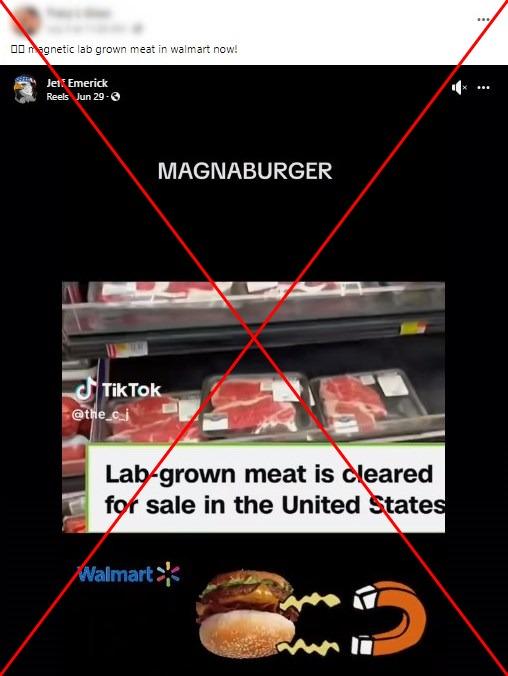
False claims about magnetism spread to lab-grown meat
- This article is more than two years old.
- Published on July 28, 2023 at 21:39
- 3 min read
- By Natalie WADE, AFP USA
A July 16, 2023 Facebook post uses a TikTok video from a store aisle, overlaid with the message: "Lab-grown meat is cleared for sale in the United States." Another Facebook user wrote with the same clip: "magnetic lab grown meat in walmart now!"
The video shows a person sticking what appears to be a small round magnet to the outside of packaged beef products. "Lab grown meat? Magnetic meat? Welcome to walmart go try this yourself!" suggests the text in the video.


Other iterations of the claim can also be found on TikTok and Facebook.
AFP has previously debunked allegations about meat and magnetism, and lab-grown meat.
The latest falsehoods gained attention online after the US Department of Agriculture (USDA) on June 21, 2023 granted its first-ever approvals for lab-grown chicken and meat products to two California-based companies, Upside Foods and GOOD Meat (archived here). Both had previously received Food and Drug Administration (FDA) safety clearance (archived here and here) to sell chicken grown directly from animal cells, however, no cell-cultivated beef, pork or seafood has received market approval.
The latest claims about magnetic properties in meat produced from cells are similarly false.
All the products shown in the video are beef -- indicating that they are not lab-grown. And while recent reports and both company websites say the poultry products are available at some restaurants -- they are not currently available in stores.
"This industry is still early in the process of commercial-scale production and will not be widely available to US consumers for some time even after all federal regulatory requirements are addressed," said FDA spokesperson Veronika Pfaeffle said in a July 27, 2023 email.
Based on the variety of approved manufacturing methods, "there is no scientific reason or credible basis to expect that food products produced with animal cells would be magnetic," she said, describing the claims as "false."
Confusion surrounding these products likely stems from scientific research on the use of magnetic fields in cell culture. In 2022, scientists at the National University of Singapore (NUS) studied how magnets can be used to produce cell-based meat. However, this is done for "research or other purposes," and is not an approved method for consumer products in the US, Pfaeffle explained.
"Human food made with cultured animal cells must meet the same stringent requirements, including safety requirements, as all other food under the Federal Food, Drug & Cosmetic Act requirements and the FDA’s regulations, as applicable," she added.
Jon Regenstein, a professor emeritus of food science at Cornell University, told AFP that even in the study of electromagnetic waves and their influence on growth this would not leave the meat magnetized. "Once you turn the waves off, you have nothing there." He compares this to the waves used in Magnetic Resonance Imaging (MRI) -- which would not result in a subject becoming magnetic.
Lab-grown meat involves first harvesting cells from a living animal or a fertilized egg, to establish a cell bank that can be kept for decades in deep freeze. They are then cultivated in bioreactors where they are fed nutrients similar to what animals would eat.
After several weeks, the resulting product is harvested from the tank and molded into shapes, such as chicken fillets.
"You certainly have to give (the cells) a source of iron," he said, but added, "I'm quite sure that cell-culture meat from a legitimate company is not going to lift itself up and be magnetic."
Iron is a natural component of beef and other meats but Jaydee Hanson, policy director at the Center for Food Safety, an activist group, told AFP in a June 2021 fact check: “While there is a remote chance that a powerful magnet could pick up on the magnetism of the iron in meat, it is really unlikely that most refrigerator magnets are that sensitive."
In that fact check, the USDA addressed similar videos, in which consumers demonstrate magnets sticking to meat products. Magnets might stick to meat and poultry “due to the texture, angle or moisture of the product,” a spokesperson told AFP, dismissing the claims as a hoax.
Copyright © AFP 2017-2026. Any commercial use of this content requires a subscription. Click here to find out more.
Is there content that you would like AFP to fact-check? Get in touch.
Contact us
